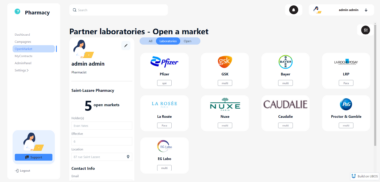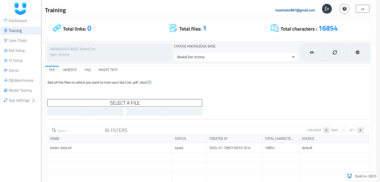MCP Server Overview
The Model Context Protocol (MCP) Server is a groundbreaking innovation designed to bridge the gap between AI models and external data sources. Specifically, the MCP Server for NASA’s Earthdata Search Common Metadata Repository (CMR) integrates AI retrievals with NASA’s extensive catalog of datasets. This integration is facilitated through Earthaccess, making it an indispensable tool for data scientists, researchers, and AI developers.
Key Features
Standardized Protocol: MCP is an open protocol that standardizes how applications provide context to Language Model Models (LLMs), ensuring seamless interaction between AI models and external data sources.
Versatile Integration: The MCP Server acts as a bridge, allowing AI models to access and interact with a wide array of external data sources and tools. This feature is particularly beneficial for organizations that rely on diverse datasets.
AI Framework Compatibility: The server is compatible with popular AI frameworks like Claude desktop and ChatGPT desktop, making it easy for developers to integrate and utilize.
Customizable Configuration: Users can easily update configuration files such as
claude_desktop_config.jsonto tailor the server to their specific needs, ensuring a personalized experience.Robust Search Capabilities: With the MCP Server, users can prompt AI agents to perform specific data searches, such as retrieving datasets from specific years or with particular keywords, enhancing data accessibility and utility.
Use Cases
Research and Development: Researchers can leverage the MCP Server to access NASA’s vast datasets, facilitating advanced studies in climate science, earth observation, and more.
Enterprise Data Integration: Businesses can integrate the MCP Server with their existing AI frameworks to enhance data-driven decision-making processes.
Educational Purposes: Educational institutions can use the server to provide students with real-world data access, enriching their learning experiences.
UBOS Platform Integration
UBOS is a full-stack AI Agent Development Platform dedicated to bringing AI Agents to every business department. By integrating with the MCP Server, UBOS enhances its capability to orchestrate AI Agents, connect them with enterprise data, and build custom AI Agents using LLM models and Multi-Agent Systems. This integration not only broadens the scope of data accessibility but also enhances the functionality of AI Agents, making them more efficient and effective in various business operations.
Installation and Configuration
To install and run the MCP Server, users need to clone the repository to their local environment and follow the installation steps, including setting up the uv package manager and configuring the AI framework. The server’s setup is straightforward, ensuring that even users with minimal technical knowledge can get it up and running quickly.
Conclusion
The MCP Server is an essential tool for anyone looking to harness the power of AI in conjunction with NASA’s extensive datasets. Its seamless integration capabilities, coupled with the robust features of the UBOS platform, make it a must-have for researchers, developers, and enterprises aiming to stay at the forefront of AI and data science innovation.
NASA Earthdata Search
Project Details
- podaac/cmr-mcp
- Last Updated: 4/15/2025
Recomended MCP Servers

基于MasterGO构建MCP服务
A Model Context Protocol (MCP) Interface around the Gumloop API
Guide to connect to Trade Agent's MCP server and trade stocks and crypto
This MCP plugin integrates with the Spheron SDK to provide compute deployment capabilities directly through Claude.

FRED (Federal Reserve Economic Data) API integration with Model Context Protocol (MCP)

A Model Context Protocol server implementation for Dart task management system
MCP for reverse engineering

Example Usage of model context protocol in Artificial Intelligence
MCP server to provide Figma layout information to AI coding agents like Cursor
MCP server to integrate AWS S3 and LLM
This read-only MCP Server allows you to connect to Stripe data from Claude Desktop through CData JDBC Drivers....
 From vibe coding to vibe deployment. UBOS MCP turns ideas into infra with one message.
From vibe coding to vibe deployment. UBOS MCP turns ideas into infra with one message.






